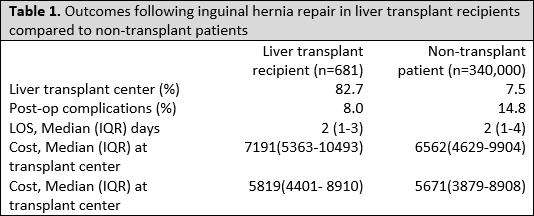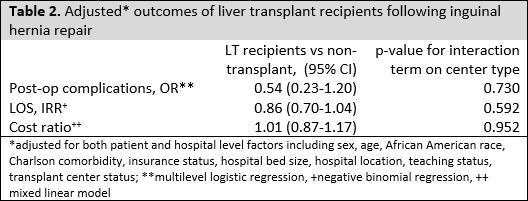Outcomes Following Inguinal Hernia Repair in Liver Transplant Recipients.
Surgery, Johns Hopkins, Baltimore.
Meeting: 2016 American Transplant Congress
Abstract number: C228
Keywords: Liver, Outcome, Surgical complications
Session Information
Session Name: Poster Session C: Liver Transplantation Complications and Other Considerations
Session Type: Poster Session
Date: Monday, June 13, 2016
Session Time: 6:00pm-7:00pm
 Presentation Time: 6:00pm-7:00pm
Presentation Time: 6:00pm-7:00pm
Location: Halls C&D
Liver transplant (LT) recipients are assumed to have poor outcomes following general surgical procedures, which may be a reason why most are directed to transplant centers for surgical care. This study to investigates outcomes of LT recipients following inguinal hernia repair using a nationwide dataset.
METHODS: The Nationwide Inpatient Sample was used to study adult LT recipients and non-transplant recipients who underwent open inguinal hernia repair between 2000-2011. Outcomes at either a transplant or non-transplant center were compared. ICD-9 codes were used to categorize complications. Multilevel logistic, negative binomial and linear mixed models were used to compare complications, length of stay (LOS) and hospital charges respectively.
RESULTS: Of 681 LT recipients, 82.7% underwent inguinal hernia repair at a transplant center compared to 7.6% of non-transplant patients (n=340,000). Primary admission complication rate for LT recipients were lower (8% vs 14.8%, p=0.01). After adjustment, LT recipients were not at higher risk of complication (OR 0.54, 95%CI: 0.23-1.20), and did not differ significantly by transplant center status (interaction p=0.998). Median LOS for both groups was 2 days regardless of transplant center status (OR 0.86, 95%CI: 0.70-1.04, interaction p=0.592). Median hospital charges for LT recipients were higher ($7133 vs $5741, p=0.001), however after adjustment, there were no significant differences in cost between patient groups or center type (OR 1.01, 95%CI: 0.87-1.17, interaction p=0.952).
CONCLUSIONS: Early outcomes after inguinal hernia repair for LT recipients are comparable to non-transplant patients. Although the majority of LT recipients undergo repair at transplant centers, complication rates, LOS and hospital charge are not significantly different. This suggests that inguinal repair is safe and feasible at either center type. 

CITATION INFORMATION: Dagher N, DiBrito S, Olorundare I, Landazabal C, Segev D. Outcomes Following Inguinal Hernia Repair in Liver Transplant Recipients. Am J Transplant. 2016;16 (suppl 3).
To cite this abstract in AMA style:
Dagher N, DiBrito S, Olorundare I, Landazabal C, Segev D. Outcomes Following Inguinal Hernia Repair in Liver Transplant Recipients. [abstract]. Am J Transplant. 2016; 16 (suppl 3). https://atcmeetingabstracts.com/abstract/outcomes-following-inguinal-hernia-repair-in-liver-transplant-recipients/. Accessed January 8, 2026.« Back to 2016 American Transplant Congress
